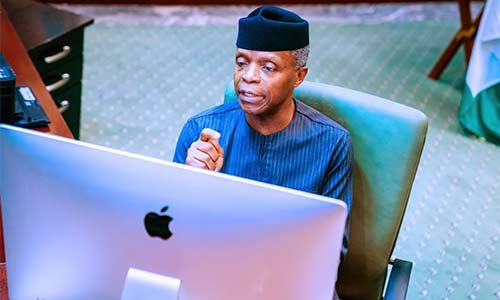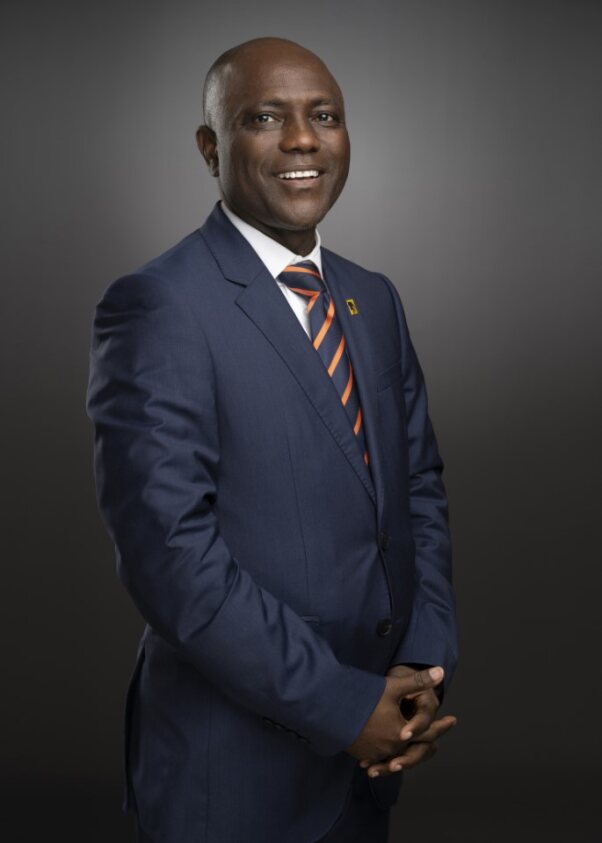Business
FG unveils N348.7tn National Development Plan

-
Private sector to drive initiative with 85% contribution
Vice President Yemi Osinbajo is to lead the federal government’s National Economic Development Plan (NDP) of N348.7 trillion.
The ambitious project, which some experts tagged as a “serious stimulus package if well-coordinated and executed” would be driven by the public and private sectors.
Atedo Peterside, an entrepreneur, investment banker and founder of Stanbic IBTC Bank Plc, is to serve as co-chair.
The amount earmarked for the five-year plan almost doubled Nigeria’s Gross Domestic Product (GDP) which was estimated at $429.42 billion (N176.315tr) as of 2020.
GDP is the total monetary or market value of all the finished goods and services produced within a country’s borders in a specific period.
The approval was announced Wednesday after the Federal Executive Council (FEC) meeting presided over by Vice President Yemi Osinbajo.
READ ALSO:
- Police uncover illegal military training camp in Lagos – Arrest 108 suspects
- Siyabonga: BBNaija’ Cross arrested in South Africa
- Kano lawyer sent to prison over Abduljabbar’s case
The Minister of Finance, Budget and National Planning, Zainab Ahmed, told reporters that the new initiative replaced the Economic Recovery and Growth Plan (ERGP) set to elapse in December this year.
The minister said the public sector would contribute N49.7 trillion (14.3%) to the investment size, and the private sector N298.3 trillion (85.7%).
She said the plan was structured on economic growth and development, infrastructure, public administration, human capital development, social development and regional development.
According to her, the funding strategy includes broadening the tax base and expanding the capacity of the private sector through creating investment opportunities and delivering quality engagements and incentives.
She added that the plan was underpinned by a macroeconomic framework that projects average GDP growth of 5% over the plan period.
How Osinbajo, others will drive initiative
The finance minister said there will be a Development Plan Implementation Unit that would report to the National Steering Committee, which will be headed by the vice president with the minister of finance, budget and national planning as vice-chair.
The minister said the Development Plan Implementation Unit would be in the planning arm of the ministry.
Zainab said the coordination of the implementation of the plan would be carried through to ensure that MDAs, state governments, private sector operators, civil society organisations, among others, were all working in a coordinated fashion.
Speaking further, the minister of state for Budget, Clem Agba, said the governance structure of the plan would have Mr Atedo Peterside as co-chair from the private sector.
He said the National Steering Committee had 42 members comprising key ministers, representatives of the Manufacturers Association of Nigeria, other organs of the private sector and six governors representing the geo-political zones.
Good news but…
A financial expert, Umar Mohammed, said it was cheering news from the federal government.
“Development planning is necessary for any serious government and it is not late that we have this one. I am impressed with some of the names I heard.
“All over the world, it is public-private partnership that drives the economy. I am sure that if properly managed, the resources would reduce poverty through job creation. I also hope that the federal government will expand its tax net by tracking taxable incomes and channelling them to viable ventures.
“Similarly, investors from the private sector should be assured that their investment is secured. We should also improve security to attract direct foreign investment,” he said.
An economic commentator and lecturer at the University of Nigeria (UNN), Mr David Aku, said while development plans are great, it is the follow-through that made the difference.
“We have had so many development plans in the past in Nigeria. Can we say any of them has been followed through? I guess not. None has been followed through from the beginning to the end. So I am not excited about this economic development plan by the Buhari administration,” he said.
He said it was more worrisome when you realise that Buhari’s government had less than two years to end, adding that not much of the implementation will happen in the lifetime of this government.
The “2021 to 2025 development plan for the medium term and this government’s life ends in 2023. I don’t know how much of the implementation would happen. I am not excited really,” he said.
Daily Trust
Business
Naira depreciates against dollar as speculators reportedly hoard

Naira depreciates against dollar as speculators reportedly hoard
The naira fell in value against the US dollar to N1,234 in the official foreign exchange market on Monday, according to statistics from the FMDQ securities exchange.
The currency rate indicates that the naira decreased by N65, or 5.26 percent, from N1,169.99/$1 recorded on Friday.
The local currency had strengthened to about N1,072.74 on Wednesday, as traders expected the naira will trade below N1,000/$1 for the first time.
However, the latest drop appears to coincide with the remarks of the apex bank Governor, Yemi Cardoso, who stated that the intent of the bank was not to defend the Naira, when asked about the sudden drop in external reserves.
Nigeria’s foreign exchange reserves have maintained a one-month dip streak. The latest figures from the Central Bank of Nigeria show the external reserves reached a new low of $32.1bn on April 18, 2024. The reserves dropped by $2.35bn in 31 days, from $34.45bn on March 18, 2024.
But the CBN governor at the International Monetary Fund/World Bank Spring Meetings stated that the bank would refrain from intervening in the exchange unless unusual circumstances arose, stressing that the recent slight shift in reserves was unrelated to defending the naira.
READ ALSO:
- Four vandalised towers disrupt power supply to Gombe, Yola, Jalingo
- N200bn Intervention Fund: FG begins disbursement to MSMEs, manufacturers
- EFCC denies disobeying court order, urges Yahaya Bello to submit himself
He said, “I want to make this as clear as possible, it is not in our intention to defend the naira. and as much I have read in the recent few days, some opinions with respect to what is happening with our reserves and if the central bank is defending the naira.”
The national currency had slumped badly in the forex market in the weeks preceding the clampdown on Binance, exchanging for as much as N1,950 in mid-February.
Observers blamed its earlier misfortune on alleged manipulation of the market by Binance. However, some stakeholders have accused the new crypto exchange platforms BYBIT and BITGET for the latest slip.
Analysts suggested that the naira experienced a depreciation over the span of six months from July 2023 to January 2024, particularly evident in the black market following the disbursement of funds by the FAAC to federal, state, and local government authorities.
The summary of the forex transaction showed that the intra-day high depreciated, closing at N1,295 per dollar. The intra-day low also reduced to N1,051/$. While the total daily turnover dropped slightly to $110.17m on Monday.
At the parallel market, currency traders sold the dollar between the rate of N1,250 and N1,270 from N1,154 recorded last Friday.
Bureau de Change operators who spoke to our correspondent said the reason for the new increase in dollar rate was due to market forces, adding they were unsure if there would be more increase or reduction before the end of the week.
The naira’s surge since late March, which had made it the best-performing currency in the world, came to a stop on Sunday when it had its first weekly decline in several weeks on the parallel market.
A BDC operator, Abubakar Taura said, “We sold the dollar today between the rate of N1,50 and N1,270 and it is a bit surprising because we don’t even know the real reason but that is the market, one day there will be profit and another day we make losses.”
Naira depreciates against dollar as speculators reportedly hoard
Business
Olusegun Alebiosu named acting Chief Executive of FBN

Olusegun Alebiosu named acting Chief Executive of FBN
FBN Holdings Plc has named Mr Olusegun Alebiosu as acting Chief Executive of the First Bank of Nigeria Limited (FirstBank), its flagship subsidiary.
This is coming after the recent resignation of the bank’s Managing Director/Chief Executive, Dr Adesola Adeduntan.
This is contained in a statement to the Nigerian Stock Exchange, signed by the holdings’ acting Company Secretary, Adewale Arogundade.
It said the appointment taking immediate effect would be subject to the approval of the Central Bank of Nigeria (CBN).
The statement added that the announcement was in accordance with the Rulebook of The Exchange (Issuers’ Rules), which required that the Nigerian Exchange Limited and the investing public be duly notified of such development.
Alebiosu was an Executive Director/Chief Risk Officer who jointly led the transformation of FirstBank over the past eight years, and was an integral member of the team under the previous CEO’s leadership.
He joined FirstBank in 2016 and has over three decades of banking experience.
“The Board of Directors expressed gratitude to Adeduntan for his exemplary leadership in the last nine years during which he superintended the transformation and growth of the bank and wish him well in his future endeavours,” the statement added.
The new acting First Bank CEO commenced his professional career in 1991 with Oceanic Bank Plc (now EcoBank Plc).
Prior to joining FirstBank in 2016, he had served as Chief Risk Officer at Coronation Merchant Bank Limited, Chief Credit Risk Officer at African Development Bank Group, and Group Head, Credit Policy and Deputy Chief Credit Risk Officer at United Bank for Africa Plc.
He is an alumnus of Harvard School of Government and holds a bachelor’s degree in Industrial Relations and Personnel Management.
Alebiosu also obtained a master’s degree in International Law and Diplomacy from the University of Lagos and holds a master’s degree in Development Studies from the London School of Economics and Political Science.
Auto
FG to roll out 200 CNG buses, 2,500 tricycles next month

FG to roll out 200 CNG buses, 2,500 tricycles next month
- Targets one million automobiles
The Federal Government says it will unveil its first set of Compressed Natural Gas (CNG) vehicles and tricycles for mass transit next month (May 2024), as part of activities to mark President Bola Tinubu’s one year in office.
Special Adviser to the President on Information and Strategy, Bayo Onanuga, in a statement on Sunday said 200 buses and 2,500 tricycles powered by CNG would be unveiled.
He said the buses and tricycles would be rolled out with a set target of one million CNG-powered automobiles by 2027.
He said the committee led by Michael Oluwagbemi was set to deliver cheaper, safer and more climate-friendly energy vehicles.
Onanuga said the committee had fulfilled some foundational reforms to enable the new CNG and electric vehicles to deliver the future Tinubu promised.
He added that all was ready for delivery of the first set of critical assets for deployment and launch of the vehicles ahead of the first anniversary of the Tinubu administration on May 29.
Onanuga also said, “In collaboration with the private sector, the PCNGI is set to deliver 100 conversion workshops and 60 refuelling sites spread across 18 states before the end of this year.”
The Federal Government provided N100 billion, as part of the N500 billion palliative budget, to purchase 5,500 CNG vehicles, being part of the many intervention programmes to cushion the effect of increase in petrol pump price on the masses.
This included buses and tricycles, 100 electric buses and over 20,000 CNG conversion kits, with the development of CNG refilling stations and electric charging stations.
Onanuga said with necessary tax and duty waivers approved by Tinubu in December 2023, the private sector partners in the Presidential CNG Initiative (PCNGI) had responded with over $50 million investments in refuelling stations and conversion centres
He stated, “Also, a safety policy document on 80 standards and regulations that must be strictly adhered to by operators has been developed and approved to ensure CNG conversions are done safely and reliably.
“The deployment of CNG buses and tricycles and the vision to get at least one million natural gas propelled vehicles on our roads by 2027 will mark a major energy transition in our country’s transportation industry.
Onanuga also said, “Four plants owned by JET, Mikano, Mojo, and Brilliant EV located in various parts of the country are involved in the assembly of the Semi Knocked Down (SKD) components of the CNG buses.
“JET, which has received the SKD parts, is coupling the buses in Lagos and is working towards delivering 200 units before the first anniversary of the Tinubu administration.
“Brilliant EV will assemble electric vehicles. It is awaiting the SKD parts, which will arrive in due course. The electric vehicles it will produce are meant for states, such as Kano and Borno, which do not have access to CNG for now.
“They will also be available in key Nigerian cities and university campuses.
“It must be noted that soon to be completed gas pipeline projects initiated by the Buhari administration and being completed by NNPCL (the AKK Pipeline) will take gas into the hinterlands of North-East and North-West where there is current paucity.”
He said over 600 buses were targeted for production in the first phase this year while a new plant on the Lagos-Ibadan Expressway would assemble thousands of tricycles.
“The SKD parts manufactured by the Chinese company LUOJIA in partnership with its local partner to support the consortium of local suppliers of CNG tricycles are set for shipment to Nigeria and expected to arrive early in May. About 2,500 of the tricycles will be ready before May 29, 2024.
“Thousands of conversion kits for petrol powered buses and taxis that want to migrate to CNG are also ready with CNG cylinders.
“The Federal government intends to provide them at subsidised rates, especially to commercial vehicle drivers to bring down the cost of public transportation.”
As part of private sector collaboration, NIPCO and BOVAS are involved in offering refilling services for the CNG vehicles and also serving as conversion centres.
NIPCO is setting up 32 stations nationwide to offer the services. The company has completed the set-up of four of the CNG stations.
“Likewise, BOVAS is setting up eight stations in Ibadan, two each in Ekiti, Abuja and four in Ilorin.
“MRS is also involved. It is making efforts to announce where its refilling stations and conversion centres will be,” Onanuga added.
He also said NNPC Limited, which had launched an on-and-off CNG initiative in the past, was joining the new initiative and expected to announce the locations for CNG refilling and CNG conversion centres nationwide.
The statement said PCNGI was working with 22 other agency-partners, including the Standards Organisation of Nigeria (SON) and National Automotive Design and Development Council, to deliver 80 Natural Gas Vehicle Conversion and Associated Appliances Standards for the country.
He added that the vision of the President to deliver one million gas vehicles could not be possible without the private sector, including the RTEAN, NURTW and players in the downstream sector of the transportation chain and financiers.
-

 Education3 days ago
Education3 days agoWhy we charge N42m fees for primary school pupils — Charterhouse Lagos
-

 International7 days ago
International7 days agoMuslim student loses High Court challenge against Michaela School’s prayer ban
-

 Business6 days ago
Business6 days agoGovt paying N600bn for fuel subsidy monthly — Rainoil CEO
-

 News4 days ago
News4 days agoUpdated: More trouble for Yahaya Bello as Immigration places him on watch list
-

 Auto3 days ago
Auto3 days agoWe expect massive roll-outs of Nigeria-made cars by December 2024 – Minister
-

 Business7 days ago
Business7 days agoNaira records five-month highest gain, sells below N1000/$ at parallel market
-

 News7 days ago
News7 days agoJubilation as FG begins disbursement of N200bn palliative loans
-

 News7 days ago
News7 days agoKano anti-corruption agency slams fresh charges against Ganduje


















